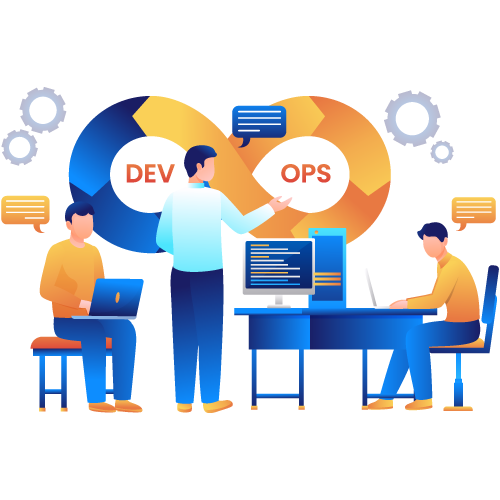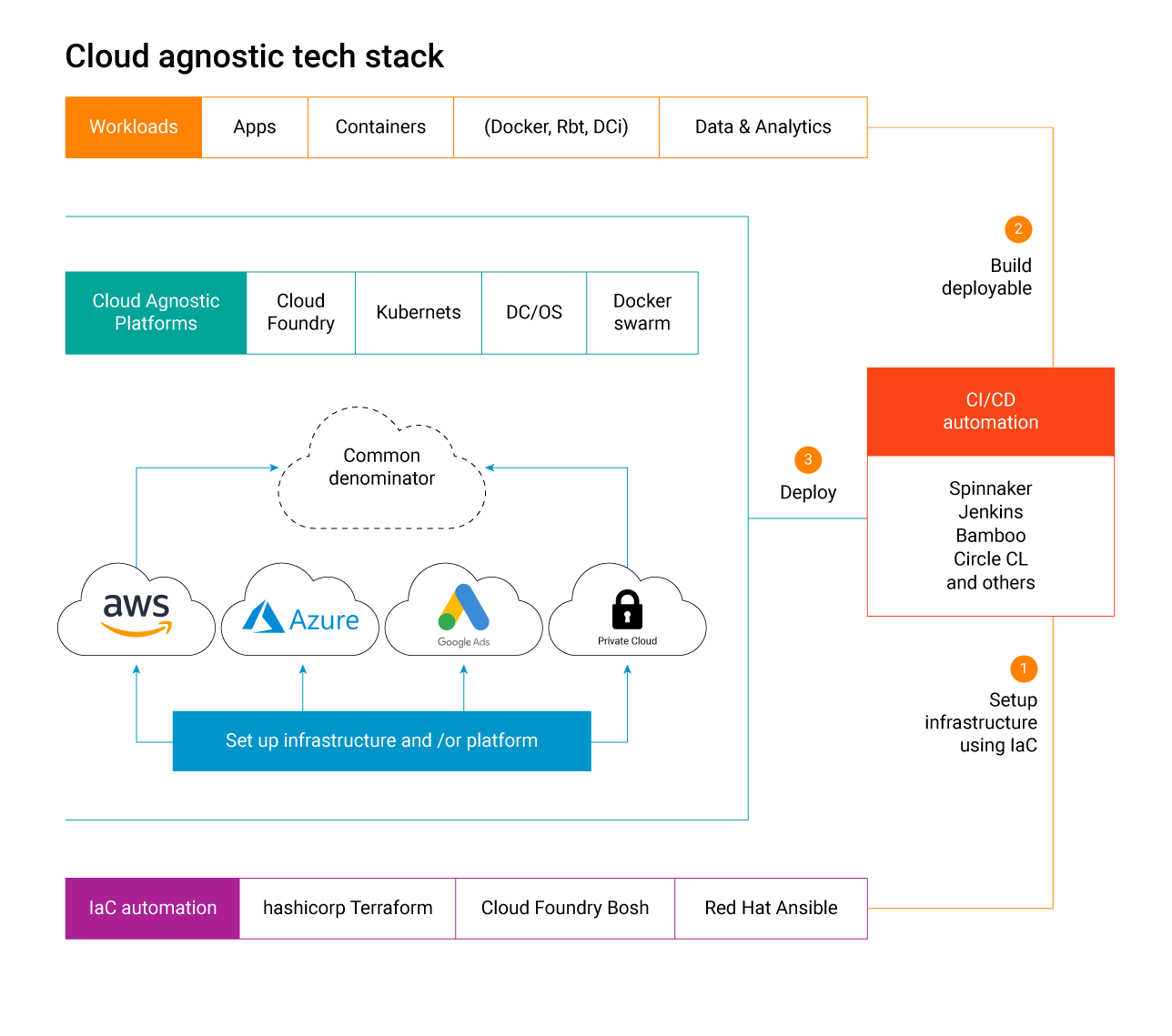
Specialise in Implementing Modern DevOps Practices
DevOps is more than just a buzzword; it's a transformational approach that merges both developmental and operational methodologies to improve the software lifecycle. DevOps Services Melbourne by Achyut Labs are crafted for organisations, regardless of their size - from startups to large-scale enterprises, aiming for efficient software development, deployment, operation, and management processes.The essence of DevOps Practices revolves around amalgamating cultural philosophies with pragmatic tools. This approach propels organisations to deliver applications and services at a remarkable speed, thereby enhancing their market competitiveness and meeting customer demands swiftly. Traditional software development and infrastructure management methods often lag in this rapid evolutionary race.
Diving deeper, DevOps Services Australia by Achyut Labs epitomises the modern implementation of these DevOps Practices, emphasizing critical aspects like continuous integration, continuous delivery, and infrastructure as code. The key lies in automating erstwhile manual tasks, coupled with best practices. This not only amplifies efficiency and security but also drastically reduces errors, thereby uplifting the quality of your software.
At the heart of our services is a team of seasoned DevOps engineers, dedicated to scrutinising your current development and deployment strategies. Their expertise guarantees tailored solutions, meeting the unique business needs and challenges faced by your organisation.
Our DevOps Services Include o
Infrastructure as code o
We help you create and manage infrastructure using code, which makes it easier to automate infrastructure deployment and management. We deal with all market leader cloud providers like AWS, GCP and Azure etc.
Continuous integration o
We help you automate the process of building, testing, and merging code changes to ensure that your software is always ready for deployment.
Continuous delivery o
We help you automate the process of deploying your software to production, making it faster and more reliable.
Monitoring and logging o
We help you set up monitoring and logging systems to identify problems before they become critical issues.
Cloud migration o
We help you migrate your applications and infrastructure to the cloud, ensuring scalability, reliability, and security.
Security o
We help to integrate security policy into all stages of the DevOps services and achieve greater resilience and fewer threats.
Microservices o
We can help to build applications that are more flexible, scalable, and resilient than traditional monolithic applications. Our team of experts can help you navigate the complexities of microservices development and deployment, and ensure that your applications are built to meet your business needs. Contact Achyut Labs today to learn more about how we can help you with microservices.
Communication and Collaboration o
We can help organisations improve communication and collaboration between development and operations teams, leading to faster feedback loops, improved problem-solving, and reduced errors. By working together more effectively, teams can achieve shared goals and objectives and continuously improve processes and systems over time.
Key Benefits of DevOps Services o

Faster time to market
DevOps practices can help organisations release software faster and more frequently, reducing time to market and enabling them to respond quickly to changing business needs. It will help to achieve Agile and Lean processes into practice truly.
Improved collaboration
DevOps practices emphasise collaboration between development and operations teams, breaking down silos and improving communication across departments.
Increased efficiency
By automating manual tasks, DevOps practices can help organisations increase efficiency, reduce errors, and streamline processes.
Better quality
DevOps practices can help organisations improve the quality of their software by implementing automated testing and continuous integration and delivery.
Higher reliability
DevOps practices can help organisations improve the reliability of their software by implementing monitoring and logging systems and automating deployment processes.
Scalability
DevOps practices can help organisations scale their infrastructure quickly and efficiently, allowing them to handle increased traffic and demand.
Cost savings
By streamlining processes and eliminating manual tasks, DevOps practices can help organisations reduce costs associated with software development and deployment.
Increased agility
DevOps practices can help organisations become more agile and responsive to changing business needs, enabling them to innovate and stay ahead of the competition.
In summary,The Key Benifits of DevOps services offer a wide range of benefits that can help organisations improve efficiency, quality, reliability, scalability, and agility while reducing costs and time to market.
DevOps Technology Enablement o
DevOps technology enablement refers to the process of implementing and leveraging technologies to support DevOps practices and principles. Here are some of the key technologies that Achyut Labs can handle to enable DevOps:
- Continuous integration and continuous delivery (CI/CD) tools: CI/CD tools automate the process of building, testing, and deploying software, helping organisations release software more quickly and efficiently.
- Configuration management tools: Configuration management tools enable organisations to manage and automate the configuration of their infrastructure, making it easier to deploy and manage applications at scale.
- Containerization technologies: Containerization technologies such as Docker and Kubernetes enable organisations to package applications and their dependencies into portable containers, making it easier to deploy and manage applications across different environments.
- Cloud computing platforms: Cloud computing platforms such as Amazon Web Services (AWS), Microsoft Azure, and Google Cloud Platform (GCP) provide on-demand access to scalable computing resources, making it easier to deploy and manage applications in the cloud.
- Monitoring and logging tools: Monitoring and logging tools enable organisations to track the performance of their applications and infrastructure, identify issues, and troubleshoot problems quickly.
- Collaboration tools: Collaboration tools such as chat platforms, issue trackers, and code repositories help teams work together more effectively and communicate more easily.

By implementing these and other technologies, organisations can enable DevOps practices and principles, automate manual tasks, and streamline processes, leading to faster delivery of high-quality software. However, it's important to note that technology enablement is just one part of a successful DevOps implementation. Organisations also need to focus on culture, collaboration, and process improvements to fully realise the benefits of DevOps.
It's important to note that this is not an exhaustive list, and there may be other tools and technologies that are better suited to a particular organisation's needs. It's also worth noting that while technology is an important part of DevOps, it's only one piece of the puzzle. Successful DevOps implementations also require cultural and organisational changes, such as a focus on collaboration, communication, and continuous learning and improvement.
Here's a list of some popular DevOps tools and technologies: o
1.
Continuous integration and continuous delivery (CI/CD) tools: Jenkins, Cloud Native CI/CD Tekton, GitLab CI/CD, CircleCI, Travis CI, Bamboo, TeamCity, and Azure DevOps.
2.
Configuration management tools: Ansible, Chef, Puppet, and SaltStack.
3.
Containerization technologies: Docker, Kubernetes, OpenShift and Docker Swarm.
4.
Cloud computing platforms: Amazon Web Services (AWS), Microsoft Azure, Google Cloud Platform (GCP), and IBM Cloud.
5.
Monitoring and logging tools: Prometheus, Grafana, ELK Stack (Elasticsearch, Logstash, Kibana), Splunk, Nagios, and Zabbix.
6.
Collaboration tools: Slack, Microsoft Teams, Jira, Trello, and Asana.
7.
Source code management tools: Git, GitHub, GitLab, and Bitbucket.
8.
Infrastructure as code (IaC) tools: Terraform, CloudFormation, and Ansible.
9.
Testing tools: Selenium, JMeter, and Gatling.
10.
Security tools: SonarQube, OWASP ZAP, and HashiCorp Vault.
11.
Software Supply Chain Platform and Registry: JFrog, SonaType Nexus, Quay.io, Docker Hub, Cloud Registries.
Containerisation - Modernise Software Strategy and Deployment Process: o
Containers play a crucial role in enabling DevOps methodology by bringing developers and IT operations closer together and making it easier for them to collaborate effectively. Adopting the container workflow provides many customers with the DevOps continuity they've sought but previously had to implement via more complex configuration for release and build pipelines. Container orchestration platforms like Kubernetes enable companies to deliver a highly productive platform-as-a-service (PaaS) that addresses many of the infrastructure and operations-related tasks and issues around cloud-native application development, so that development teams can focus.
Container Apps can help simplify and accelerate development and testing (dev/test) across any platform, while Azure DevOps Services can help build, test, and deploy with CI/CD that works with any language, platform, and cloud, connecting to GitHub or any other Git provider and deploying continuously.
Containerization is a method of virtualization that allows multiple applications to run on a single operating system instance, isolated from each other. A container is a lightweight, standalone, and executable package that includes everything needed to run the application, such as code, runtime, system tools, libraries, and settings.
Containerization has become increasingly popular as a software deployment strategy due to its many benefits, including:
- Portability: Containers are designed to be portable, which means they can run on any platform, from development to production, without any modifications.
- Scalability: Containers can be easily scaled up or down to meet the changing demands of the application, without the need to rebuild the entire infrastructure.
- Consistency: Containers ensure consistency across different environments, making it easier to develop and deploy applications across various stages of the software development lifecycle.
- Resource efficiency: Containers are lightweight and share resources with the host operating system, which means they require fewer resources compared to virtual machines.
- Security: Containers are isolated from each other and from the host system, providing an extra layer of security.
To use containerization as a software deployment strategy, developers package their applications as containers and deploy them to a container orchestration platform, such as Kubernetes, Docker Swarm, or Amazon ECS. These platforms manage the deployment, scaling, and monitoring of containers across the infrastructure.
Overall, containerization is a powerful and flexible software deployment strategy that provides numerous benefits for developers, IT operations, and business stakeholders.


DevOps Success Stories: o
Achyut Labs success story includes the role of DevOps to modernise cloud based, containerised software deployment process for all its clients. Pratham RMS (Retail Management Solution) is a cloud based modernised container solution deployed on Google Cloud Platform(GCP) with CI/CD.
There are other generic success stories from market like,
Etsy is an online marketplace for handmade and vintage goods that has over 60 million registered users and more than 2 million active sellers. In 2009, Etsy was experiencing frequent downtime and slow site performance due to the manual release process for their software updates.
To address these issues, Etsy implemented a DevOps culture and automated their software development and deployment process. They created a Continuous Deployment (CD) pipeline that enabled them to deploy code changes multiple times a day.
The results of Etsy's DevOps implementation were impressive. They saw a significant reduction in downtime and an increase in site performance, resulting in a better user experience for their customers. Their CD pipeline also allowed them to respond quickly to customer feedback and make continuous improvements to their platform.
In addition to the technical benefits, Etsy also experienced cultural improvements through their DevOps implementation. The development and operations teams were able to work more closely together and collaborate more effectively, resulting in a more cohesive and productive team.
Overall, Etsy's success with DevOps demonstrates the power of implementing a culture of collaboration and automation in software development. It allowed them to improve their business performance and provide a better experience for their customers.
DevOps and Cloud Agnostic Technology: o
DevOps and cloud agnostic technology enablement go hand in hand, as DevOps practices are designed to be platform-agnostic, and cloud agnostic technologies provide the flexibility and portability needed to implement DevOps workflows across multiple cloud providers.
DevOps is a set of practices that aims to promote collaboration and communication between development and operations teams, with the goal of delivering software more quickly and reliably. To achieve this, DevOps teams use a variety of tools and techniques, such as continuous integration and deployment (CI/CD), infrastructure as code (IaC), and automation.
Cloud agnostic technologies, on the other hand, are designed to work across multiple cloud providers, providing a high degree of portability and flexibility. These technologies include containers and container orchestration platforms like Kubernetes, as well as serverless computing platforms like AWS Lambda and Azure Functions.
By leveraging cloud agnostic technologies, DevOps teams can create workflows that are not tied to any specific cloud provider, allowing them to easily move workloads between different clouds or even between on-premises and cloud environments. This provides the flexibility and agility needed to respond to changing business requirements and market conditions.

In summary, DevOps and cloud agnostic technology enablement are critical components of modern software development practices. By combining DevOps workflows with cloud agnostic technologies, organisations can create a powerful combination that enables them to deliver software more quickly and reliably, while also providing the flexibility and portability needed to adapt to changing business needs.
To Conclude the DevOps Services by Achyut labs, At every step of the way, we work closely with your team to ensure that our solutions meet your specific needs and align with your business goals. With our DevOps services, you can focus on delivering value to your customers while we take care of the technical details. We can handle end to end DevOps responsibilities for our clients or help to lend our best DevOps Engineers to offer support. Contact Achyut Labs today to learn more about how we can help you streamline your software development process and transform your IT operations.










